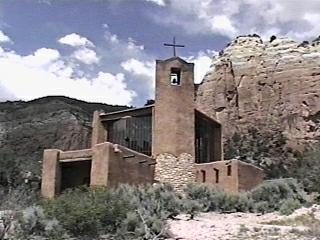It is of such a silence that I write about on the blog in the first of my posts about this extraordinary trip. I have remained silent in my apartment before, as well as in my car, and at school, and even, if I'm feeling "centered" enough, at church. However, I have never experienced a silence like the silence in which I was washed at the monastery. Silence before this trip was merely the absence of sound, of me making noise. If we try hard enough, we can all achieve an atmosphere of this brand of silence. But this is the runt cousin of the silence I encountered in the Chama River canyon. This silence was not merely absence of sound. This was a silence that was alive. Behind the fullness of quiet, I could sense a presence. I recognize how sentimental and slightly dramatic that might read, but I am not making this up for the sake of spinning this post with a devotional flair. There was truly, to me, a noticeable presence behind the silence. I could not help but think back to the story of Elijah from which I posted an excerpt in the post I wrote before departing on the trip. Within the sheer silence Elijah encountered on the mountain, all ragged, downcast with fear, and covered in his mantle, there was the unmistakable presence of God.
I am not one of the people you often meet who say, "Well, today I was praying, and God told me this ..." or "I went hiking the other day and had a vision of God ..." or "I know that Jesus is telling me to do this ..." I have always been wary of attributing the ideas in my head, the drives to say or do something, to God. I have never heard God speak audibly. Some people claim they have - still others (who I assume are secretly insecure of their own faith) adamantly state that you aren't a real person of faith unless you have heard God speak to you audibly, or Jesus, or the Spirit, or whatever is their favorite character of the Trinity. I don't know if I ever will hear God speak audibly. I believe our ears and our eyes play more tricks on us sometimes than does our heart, and so the inaudible is perhaps a safer level on which God would communicate with us. I believe God speaks - or better yet, God reveals - his desires for us and for the world, on a much deeper level. And I'll be honest, I have yet to know exactly when this communication takes place, though I suspect it is happening in some slowly constant way, 99% of the time when I am not paying attention at all.
What is the point? Two things: 1) Being in the silent canyon at the monastery revealed to me the truth of the old saying, "Silence is golden." It is awkward at first, sure, to step out of our loud lives into silent worship, but once the initial shock wears off, the peace and tranquility found within it is the stuff of matchless wonder. Our normal activities, especially within our churches today, are so very tragically rushed, and often loud for the sake of attention-grabbing. We kick the beat of praise choruses with roto-tom fills and vociferous beats of a base drum, we attempt to double and triple-strum our guitars to make our worship songs more lavish, if only to keep worship energetic, engaging. Oh, if we would only seek the opposite - to be silent before our holy God. I believe we will recognize more of what he is tellings us when we come stripped down, empty, listening instead of broadcasting. 2) I am addicted to noise. It is a sick addiction, like anything else really. There are moments, like my time at the monastery, where I catch a glimpse of the peace and the calm that can be experienced when I quiet myself, when I chuck what I think is a need to constantly feed myself with noise, be it television, radio, conversation, or talking to myself, which is something I have begun to notice I do often. Perhaps I should consider a fast for my ears - a noise fast.
I do not know how to experience that living, breathing, speaking silence I encountered in the canyon, but I believe the presence I felt there is the same presence that is settled over me now, whether I choose to recognize it - trust that it is there - or not.
There is more to that deep silence than we realize. I understand that now. We have bought into the lie that silence is merely a sign that we should seek some noise to fill the void. We have wrongly allowed the world we live in to condition our bodies and minds to feel discomfort - even dread - when we encounter silence. Instead, the next time we find ourselves awash in the soft nothingness of quiet, let us not hug our trembling shoulders nervously, but open wide our arms to embrace the Maker of silence, for in it he often chooses to dwell.
(back: Rene, Kyle, Leslie, Jill, Brandon, front: Dr. Gloer, Jeff, Courtney, Vernon)
* This is the first of several posted reflections on my experience at Christ in the Desert Monastery.
Check back soon for new entries, as well as more pictures.









